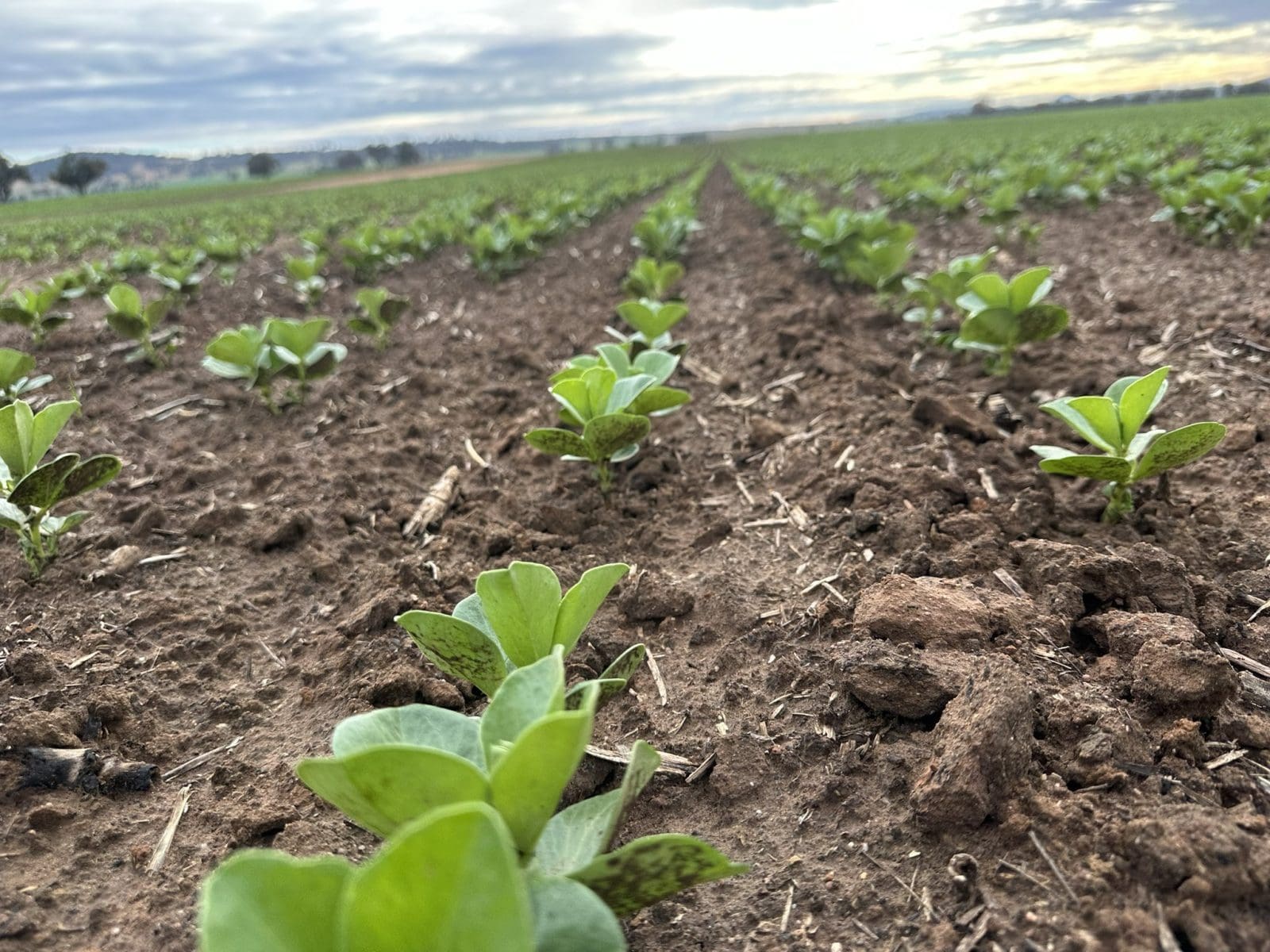
A crop of Samira faba beans pictured mid June north of Young on the south-west slopes of NSW. Photo: Growmore Agronomy Services
YIELD prospects for Australia’s lentil and faba bean crops have brightened considerably in the past month now that rain has fallen in South Australia and Victoria.
However, germination has occurred later than normal for many crops, and in the depths of winter, so double-digit falls are needed in coming weeks to put at least average yields in sight.
Chickpea crops in Queensland and northern New South Wales are looking at above-average yields provided they escape disease pressure once spring arrives.
Chickpea prices have come off the boil in response to the latest news out of India, while lentils markets are bowing to pressure from the incoming Canadian crop.
Faba bean values remain very high as current-crop stocks dwindle.
All prices are in Australian dollars unless stated otherwise.
Chickpeas
Provided potential fungal disease pressure can be controlled once the weather warms up, desi chickpea crops in the major growing areas of northern NSW through to Central Qld are looking at above-average yields.
Trade sources are forecasting Australia’s upcoming chickpea harvest at 1.5 million tonnes (Mt), well above the standing ABARES estimate of 1.5Mt, but have scoffed at 1.9-2Mt as being kicked around in the global market.
Bids for new-crop chickpeas delivered up-country packer are sitting at $950 per tonne, down $50 from last month, as the market responds to the Indian Government’s longstanding policy that prevents imported stocks from being held for more than 45 days.
Shepherd Grain trader and director Todd Jorgensen said trade bidding has subsequently gone to ground, and grower selling has also eased up.
“Some is being forward sold, but there’s a fear of waterlogging, and a fear of disease,” Mr Jorgensen said.
Contracts being offered to growers are generally either based on hectares planted, or for CHKP1, and showery weather and chatter about a La Niña weather event redeveloping, have growers concerned that mould may impact harvest quality.
“If they’ve sold a trader 1s and they harvest M, they’re out of contract.
“There’s not much interest in offering multigrade contracts, but growers are super keen for them.”
Faba beans
Shipping stems indicate a faba bean cargo which left Port Adelaide on the weekend bound for Egypt has wound up Australia’s 2023-24 bulk program.
Prices for faba beans in the prompt market remain high at around $650/t delivered as final export business for the season jostles with domestic demand to secure the last of the unpriced 2023-24 crop.
In the new-crop market, trading remains subdued as production concerns tied to limited rain to date proliferate in what are normally high-rainfall regions in south-west Victoria and South Australia’s South East.
“Prices are high because the crop is largely sold out, at least for good quality,” Agri-Oz Exports managing director Francois Darcas said.
Crops in SA have mostly had enough rain to get them into August, but heavier soils in Victoria’s Wimmera and the state’s south-west are in need of more rain very soon.
“Vic needs a lot more rain; it seems we should get some this coming week, and that will be welcome.”
Crops in NSW and Qld are generally in good to excellent condition, although they have lost area in northern NSW and southern Qld to chickpeas.
The latest Primary Industries and Resources South Australia crop and pasture report forecasts SA faba beans at 209,305t from 105,500ha, down from 217,425t from 105,700ha in 2023-24.
In contrast, PIRSA has forecast a jump in lentil production to 510,878t grown on 332,400ha, up from 362,260t from 240,200ha in 2023-24.
Lentils
Lentil prices have dropped around $100/t in the past month in response to a big crop shaping up in Canada, with prompt values now at around $900/t delivered Port Adelaide for Nipper types.
Larger Jumbo-type lentils are trading at more like $960-$980/t.
“Prices have dropped on the back of increasing container freight rates to India, and a lack of demand, plus improved growing conditions in Canada for new crop, although there is now some talk of too much rain and potential disease and yield issues,” Australian Grain Export trader Will Alexander said.
“Our rallying dollar is not helping grower prices either.”
Another trade source said freight for containers going to South Asia has jumped by up to $60/t in recent weeks, largely because of congestion at Indian ports and a shortage of vessel space.
On the production front for both faba beans and lentils, Pinion Advisory agribusiness consultant Chelsea Heinrich said this season has seen the normally higher-rainfall South East of SA suffer a moisture deficit, while crops in the lower-rainfall Murray-Mallee were going better than expected.
“Yorke Peninsula and some of the Eyre Peninsula crops are starting to come up; of all the crops of concern, lentils aren’t one of them.”
While lentils are star performers in sandy soils and showery or lower-rainfall environments, namely much of the SA growing area, Ms Heinrich said the concern is that roots will get stranded in the dry zone between the topsoil and subsoil.
“The concern is that seeds will germinate and then run out of puff.”
Ms Heinrich said crops need substantial rain to ensure that does not happen once weather starts to warm up in August.
“We’re getting drizzly stuff, but a lot more is needed.”
Forward selling from growers has been limited to date based on germination concerns, followed by the possibility that a La Niña could bring damp conditions that see foliar diseases proliferate.
“If we get a decent July and numbers hold…around that $900/t level, growers might start to look at selling.
Grain Central: Get our free news straight to your inbox – Click here

HAVE YOUR SAY